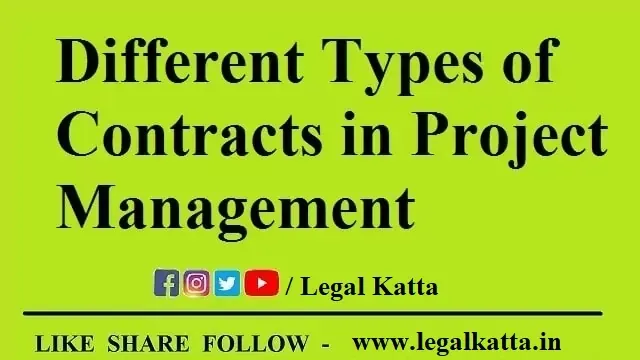If you are a project manager in your company then you should know about the different types of contracts in project management.
In this blog post, we will talk about the various project contract types with certain examples that may help you to understand them in a better way.
Before starting the types we will take quick overviews on what are essential elements are required for the valid contract.
Essentials of the Valid Contract
The contracts are legally binding on the parties if the contract fulfils the conditions given below;
- There must be at least two parties to form a valid contract.
- There should be an offer from one party to another and the offer must be genuine.
- There should be acceptance of that offer by the other party. The acceptance must be free i.e. without any pressure or force on it.
- There must be an exchange of things or anything which has equal value. This is called a consideration in a contract.
- The object of the contract must be lawful and does not disobey any legal provision.
Types of Contracts in Project Management
There are majorly three types of contracts in project management. Let's take a look.
- Firm-Fixed Project Contract (FFP)
- Time and Material Contract (T&M)
- Cost Reimbursable Contract (CR)
Firm-Fixed Project Contract
There are 3 different flavours of the fixed-price contract we discuss it for your better understanding as below:
Firm Fixed Price Contract (FFP)
This is the only variety of acquisition contracts. the vendor needs to complete the duty among Associate in the Nursing united quantity of cash and time. the vendor is to blame for any price increase and that the area unit de jure absolute to complete the task among the agreement.
A Firm-Fixed-Price contract is usually utilized in government or semi-government contracts wherever the scope of labour is outlined with high detail.
This contract is simple to float and receive bids, and it's evaluated on a price basis, which is fairly fast.
Since the vendor bears the chance, the price is higher. If the scope isn't clear, the vendor and vendee could have disputes. Any deviation from the initial scope will price you heaps.
For example, the vendor needs to paint the full building for fifty thousand USD in eighteen months.
Fixed Price Incentive Fee Contract (FPIF)
Here, though the value is fastened, the vendor might receive AN incentive if they perform well. This incentive lowers the seller’s risk.
The incentive may be tied to any project metrics like value, time, or technical performance.
Example: The contractor can receive AN incentive of ten thousand USD if they succeed in the primary milestone on time.
Fixed Price with Economic Price Adjustment (FP-EPA)
You use a Fixed-Price with an Economic value Adjustment Contract once the agreement is multi-year. This contract contains a special provision that protects the vendor from inflation.
For example: concerning the three-dimensional, the price of the project can increase when an explicit time supported the buyer indicator.
2. Time and Material Contract (T&M)
Time and Material contracts area unit very hip contract kind that is employed for normal purchases for traditional things. things might embrace augmenting temporary personnel for the project with well-defined skills and experience levels. The item additionally includes normal materials which can be required for consumption within the project.
In T&M contracts, the organization can choose some most well-liked suppliers of such personnel and materials. The vendors are going to be selected to support their capabilities and skill. there'll be a negotiated value (or rate) for such provides. the ultimate value paid is going to be for amount|the number} of the number of such resources consumed or purchased.
Managing T&M contracts is pretty straightforward. T&M contract uses each of the flavours of fastened value and compensation supported consumption.
3. Cost Reimbursable Contract (CR)
Here, the vendor is reimbursed for completed work and a fee representing their profit. Often, sellers get this fee if they meet or exceed the chosen project objectives: finishing the task earlier or saving prices, etc.
You use a value Reimbursable contract once there's uncertainty within the scope, or if the danger is higher. during this contract, the danger is on the client as they get hold of all prices.
This kind of contract is employed once the necessities aren't clear. The team additionally doesn't have abundant clarity regarding the small print of however the merchandise are developed. thus in absence of clarity on all accounts, this becomes the simplest attainable arrangement.
Cost reimbursable contracts square measure used for brand new analysis and development, proof of idea developments which needs huge innovation while not a guarantee of the anticipated outcome.

